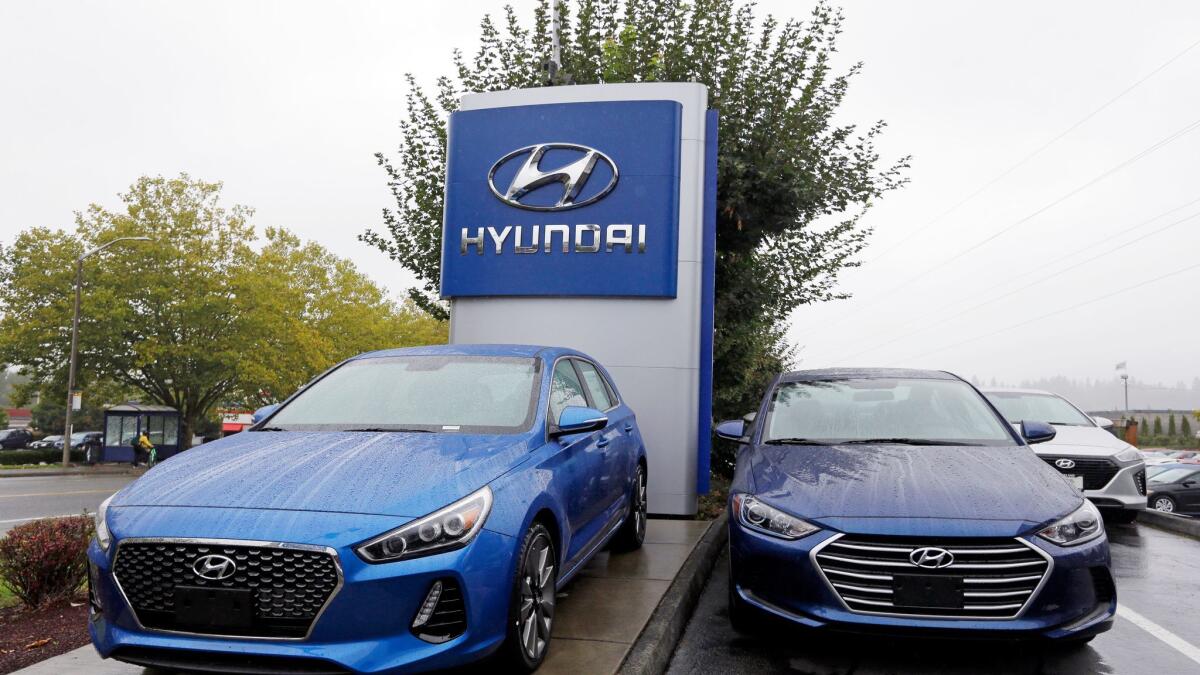Beat down by car dealers? Online auto transactions could ease car-buying pain

- Share via
Jared Mazzaschi went car shopping well prepared. He was a cash buyer who knew what he wanted, and he had agreed upon the price of the car with the Glendale dealer.
Seven or eight hours later, after an “endurance test” in which he was shuttled from salesman to salesman, baited with multiple ways to finance the transaction and offered costly upgrades he did not want, the Silver Lake writer left the dealership driving a new car. But he worried that he’d been ripped off, and was disgusted with the entire process.
Stories like these, common enough among recent car buyers, provide fresh ammunition for auto manufacturers who believe the traditional car dealership model is outdated, ineffective and perhaps even counterproductive.
“Everybody likes shopping and people love shopping for cars,” said Edmunds senior consumer advice editor Matt Jones. “What they dislike is transacting for cars. That part has to be made easier.”
Officials at car companies agree.
“The business model of having fixed stores and demanding that customers come to us is ready for disruption,” said Cadillac President Johan de Nysschen.
Some carmakers have a solution: Take most of the transaction online, and limit consumer-dealership contact to test-driving the car at the beginning of the process and driving it home at the end. Just as online shopping has reduced the amount of time customers spend in traditional brick-and-mortar stores, the auto companies hope to do the same for car shopping.
Hyundai last month launched a new program called Shopper Assurance. Using this web-based system, prospective car buyers, working with authorized Hyundai dealers, can peruse car prices online, complete with MSRP, incentives and other discounts; find out with certainty which dealers have which cars at which exact prices; and fill out most of the extensive paperwork online from home.
Participating dealerships will even deliver a car for a test drive, to the customer’s home or office, and will guarantee a full refund if the car is driven fewer than 300 miles and returned within three days.
Lincoln Motors has begun testing a similar program that involves at-home test drives, a more efficient online financing process and other methods of minimizing the time the car buyer spends at the dealership.
“Every other kind of shopping is already effortless,” Lincoln President Kumar Galhotra said. “We need to make the car purchasing process faster and easier.”
Hyundai’s new approach was inspired, said the company’s Chief U.S. Marketing Officer Dean Evans, when customers told brand researchers: “We are not buying a car because the process is so bad.”
Respondents told researchers that it was too confusing, involved too many different salespeople and took too long.
“A lot of people weren’t keen on the current process,” Evans said. “We decided we could do it better.”
Hyundai’s research showed managers that the average transaction was taking customers a full five hours, and that they spent much of that time sitting, waiting and worrying that they were being taken advantage of.
“Time is the ultimate luxury, especially for affluent people,” Galhotra said. “So we made this one of our biggest priorities.”
When asked what they’d be willing to give up to have a better experience, Evans said customers indicated they would pay more or even forego their favorite brand in order to avoid undergoing the new car ordeal again.
Brett Cummings, a Concord, Calif.-based electrical technician, was so put off by the test drive with the “green” salesman, the assault from the “slick” finance manager and the repeated attempts to sign him up for “clear coat” paint protection and “lifetime nitrogen” for his tires that, he said, “I will likely never buy a new car again.”
What’s interesting, Edmunds’ Jones said, is that the distaste for the process goes both ways.
“This is the big ugly elephant in the room,” he said. “The car purchasing process — a lot of people just don’t dig it. And a lot of car dealerships don’t dig it either.”
Jones, who sold new cars in Southern California for 12 years before joining Edmunds, said much of the problem lies with the paperwork and the amount of money involved in the purchase of a new car, which for many consumers is the most expensive thing they’ll ever buy, aside from a house.
“This is a huge transaction, and once the car is yours, it’s yours,” Jones said. “You can’t try it out and return it.”
Brian Maas, president of the 1,300-member California New Car Dealers Assn., said the time-consuming purchase process is due to state and federal laws.
“The contract we use to sell our cars is 28 inches long,” Maas said. “Almost all of that is dictated by state and federal law. The government has said in order to protect consumers you have to do these things, in this order, with multiple signatures and initials here and there. All that takes time.”
Maas said that, while some dealerships may welcome creative ideas from companies like Lincoln or Hyundai, automakers should exercise caution in giving sales instructions to auto salespeople.
“The manufacturers are good at making cars, but the manufacturers don’t sell cars. Dealers sell cars,” he said. “They know what consumers want.”
Mainstream automakers and new car dealerships may be coming late to the online shopping scene, but many used car companies are already doing brisk business this way.
Phoenix-based Carvana has grown quickly from its 2012 founding by offering an almost-entirely online used car-buying experience. Consumers can view cars, make selections, arrange financing and arrange a trade-in without leaving their laptops.
Carmax, Sonic Automotive, Car Gurus and Vroom offer similar services. Members-only warehouse club Costco, in partnership with automotive companies, has also become a force in non-dealership car sales.
Major manufacturers have been slow to get in on the action, in part because laws protecting franchise auto dealers prohibit automakers from selling directly to the public.
But Audi and Volkswagen, both part of the huge Volkswagen Group company, recently began to experiment with online used vehicle sales in Germany.
In China, the world’s largest car market, Guazi.com is moving in the opposite direction. The country’s biggest online used car sales company is now offering the web-based process on new car sales too. Guazi.com joins the recently launched Maodou, an online service selling only new vehicles.
Car shoppers could also make the experience easier on themselves, Jones said. Smart buyers will start the process at home, using the internet and their telephones. They’ll begin speaking with a dealer. They’ll make sure the dealer knows what they want and what they’re willing to pay, before they show up. They’ll give the dealer their Social Security number, auto insurance policy number and other key facts.
And they won’t go car shopping on a Saturday, which is the dealers’ busiest day.
“Car dealerships are empty Monday to Friday,” Jones said.
Smart shoppers will also be realistic about their budgets and their credit scores.
“People often go in trying to buy something they can’t really afford,” said Aaron Jacoby, who works with dealerships for the law firm Arent Fox.
Jones said his experience selling cars tells him dealers would love a more streamlined sales process, because it would make it possible for them to sell more cars, faster.
“If you sell four cars in a day, instead of one, that’s better,” he said.







